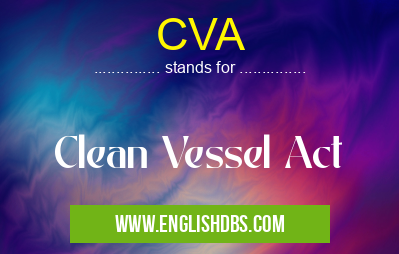What does CVA mean in LEGISLATION
The Clean Vessel Act (CVA) is a piece of legislation passed by the United States Congress in 1992. This act was established to protect and conserve our nation's waterways by providing federal funds for the construction, maintenance, and upgrading of facilities that encourage recreational boating. The CVA has had a major impact on our nation's waterways, as it has significantly reduced environmental pollution caused by recreational boaters. In addition, the act has helped to improve recreational boating safety and resulted in economic benefits for communities along our inland waterways.

CVA meaning in Legislation in Governmental
CVA mostly used in an acronym Legislation in Category Governmental that means Clean Vessel Act
Shorthand: CVA,
Full Form: Clean Vessel Act
For more information of "Clean Vessel Act", see the section below.
What the Clean Vessel Act does
The CVA provides funding for Recreational Boating Facilities (RBFs), which include boat ramps, restrooms, docks, moorings, pump-out stations and other various features designed to help make recreational boating more enjoyable and safe. The act also requires that states receiving CVA funds have a Clean Vessel Education Program in place to educate boaters about water safety and pollution prevention methods. Additionally, the act helps support local marina operators through grants, low-interest loans, subsidies and other incentives that enable them to provide quality services while still keeping their operation financially viable.
Benefits of the Clean Vessel Act
The implementation of this legislation has led to great improvements in water quality throughout United States waterways due to increased access to restrooms and pump-out services which reduce pollution from boats. It has also provided improved educational opportunities for boaters with regards to water safety as well as cleaning practices which reduce negative impacts on local ecosystems. Finally, it has provided an economic boost for coastal communities due to increased construction activity associated with RBFs funded under the CVA.
Essential Questions and Answers on Clean Vessel Act in "GOVERNMENTAL»LEGISLATION"
What is the Clean Vessel Act?
The Clean Vessel Act (CVA) is a federal law that was passed in 1992 by Congress to provide federal funding for building, renovating and maintaining pumpout and dump stations at boat docks and marinas. This fund also provides funds for boater education and outreach programs to reduce water pollution from boats.
How does the Clean Vessel Act help protect the environment?
Through providing financial assistance for pumpouts, dump stations and other infrastructure projects, the CVA helps reduce water pollution from boats. Additionally, boater outreach and education programs funded by CVA support cleaner boating practices.
What are some of the infrastructure projects funded through the Clean Vessel Act?
Infrastructure projects funded through CVA include building new or renovating existing dock facilities, pumpouts, dump stations and restrooms at marinas or other public access points.
Who manages Clean Vessel Act funds?
Management of CVA funds is split between two agencies - The U.S. Fish & Wildlife Service administers grants to states while the U.S Environmental Protection Agency administers grants directly to non-profit organizations to fund projects related to recreational boating.
What kind of activities can be funded under the Clean Vessel Act?
Projects eligible for CVA funding include construction or renovation of dock facilities, pumpouts, dump stations and restroom facilities; development of educational materials about clean vessel techniques; research studies; knowledge transfer activities; engineering assistance related to prospective sites; and cost-share grants with project beneficiaries (e.g., state agencies).
Who can apply for Clean Vessel Act funding?
Eligible recipients are states which have entry ports or bodies of water within their borders where visitors arrive via vessels; local governments; federally recognized Indian tribes; educational organizations; private non-profit entities associated with conservation or recreational boating activities ; universities; marine research institutions; volunteer organizations dedicated to improving recreation opportunities.
Does my state receive money from the Clean Vessel Act program?
The USFWS distributes CVA grants nationally on an annual basis with each state receiving an allocation based on its number of registered vessels in their waters as well as its number of boat launch ramps.
Final Words:
Overall, the passage of the Clean Vessel Act in 1992 was a huge step forward towards protecting our nation's beautiful inland waters from environmental degradation caused by recreational activities such as boating. Not only did it help keep marine environments clean but also ensure safe navigation at sea through proper training courses offered by its Clean Vessel Education program initiative. Through its multiple programs funded under this act, many coastal communities have seen an uptick in their economic well being due to booming construction industry related activities. Ultimately,the CVA is an essential piece of legislation that continues to benefit both local ecosystems and economies across our nation today.
CVA also stands for: |
|
| All stands for CVA |
